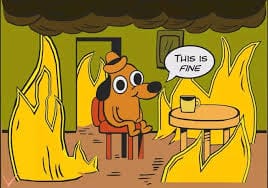This weeks podcast episode: Handle the Dumpster Fire!
In the chaotic world of healthcare, emotional overwhelm isn’t just common—it’s practically guaranteed. As nurses, we navigate high-stress environments where split-second decisions impact lives, and somehow we’re expected to maintain perfect composure throughout. But what happens when that composure cracks? When you’re running late, overwhelmed, and your executive function has exited stage left?

This week, I experienced exactly this scenario—finding myself an hour late for my own students after a cascading series of scheduling mishaps. Instead of spiraling into shame and self-criticism (a particularly challenging feat for someone with ADHD and rejection sensitive dysphoria), I employed distress tolerance techniques from DBT (Dialectical Behavior Therapy) that allowed me to navigate the storm without making it worse. These skills aren’t about performing perfectly under pressure—they’re about surviving the moment effectively.
Distress tolerance is fundamentally about riding the wave of overwhelming emotions rather than fighting against them. When we’re hit with that tidal wave of panic—whether from being late, making a medication error, or facing an unexpected crisis—our sympathetic nervous system activates, shunting blood away from our prefrontal cortex and severely limiting our executive functioning. For those of us who are neurodiverse, this compounds already-present challenges with planning, task-switching, and emotional regulation.
The first key step is simply to stop. Pause, breathe, and ask yourself: “What is the next thing I can actually do?” Not everything that needs fixing, not the entire schedule that needs rearranging, just the very next actionable step. This interrupts the panic spiral and returns a small but crucial sense of control. The concept of being “one mindful in the moment” means choosing a single task and giving it your complete attention, rather than frantically multitasking in an attempt to catch up to some imaginary schedule.
Perhaps the most challenging but transformative aspect of distress tolerance is radical acceptance. For high-achieving healthcare professionals, accepting that we’ve made a mistake or fallen short of expectations can feel excruciating. Yet fighting reality only compounds our suffering. Radical acceptance means acknowledging “Yes, I’m late,” or “Yes, this situation is chaotic,” without immediately launching into self-flagellation. It doesn’t mean you like what’s happening or that you won’t take steps to address it—it simply means you stop wasting energy fighting against what has already occurred.
This connects directly to what I call the “self-respect effect.” When I finally arrived to teach my students, I didn’t offer elaborate excuses or perform false apologies. I simply told the truth: “I had a rough start today, but I am fully here for you now.” The result? Rather than judgment, I received respect for my honesty and integrity. This modeling of authentic human vulnerability is particularly powerful in nursing education, where students benefit from seeing how professionals navigate stress and imperfection with grace.
For nurses, these skills aren’t luxury items—they’re survival tools. The weight of responsibility we carry in healthcare means we’re already operating at elevated stress levels compared to many other professions. We need practical, accessible methods for creating intentional space amidst chaos, preserving our well-being while continuing to provide excellent care. Radical compassion for ourselves isn’t selfish—it’s necessary for sustainable practice in a demanding profession.
The foundation for applying any of these skills is the ability to create intentional space—even if just for a moment or two. This is where ritual comes in: practiced, habitual applications of words, behaviors or objects that help signal to your nervous system that it’s safe to pause. These don’t need to be elaborate; they can be as simple as three deep breaths before entering a patient’s room or a specific phrase you repeat to yourself when feeling overwhelmed. The key is consistency and intentionality.
Whether you’re struggling with ADHD, anxiety, or simply the everyday overwhelm of healthcare work, remember that your exhaustion is not your identity. It’s a temporary state that, with the right tools, you can navigate with dignity and self-compassion. You are not your charting, your trauma, or your mistakes. You are sacred, you are human, and you deserve more than just barely functioning.



0 Comments